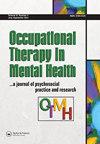Relationship between Sensory Profile and Self-Perceived Quality of Life in People with Schizophrenia: An Exploratory Study
IF 0.9
Q4 REHABILITATION
引用次数: 0
Abstract
Abstract The aim of this study was to explore the relationship between sensory profiles and the quality of life. Methods: A cross-sectional study was conducted with 99 participants, with a diagnosis of schizophrenia. Adolescent/Adult Sensory Profile, the WHOQOL-BREF and PANSS were administered. A stepwise linear regression analysis was performed, with those variables of the sensory profile and the dimensions of quality of life that showed a statistically significant correlation. Participants with lower quality of life (WHOQOL-Bref score ≤ 60) showed a higher score in Low Registration profile (t(97) = 2; p = .048; δ = .42). Physical Health showed a moderate negative correlation with Sensory Sensitivity profile (r = −.415; p < .01) and Sensation Avoiding (r = −.372; p < .05). Psychological Health showed a moderate negative correlation with Low Registration (r = −.354; p < .01), Sensory Sensitivity (r = −.307; p < .01) and auditory processing (r = −.343; p < .01). Sensory preference could be a key aspect of mental health rehabilitation programs. Sensory modulation issues seem to be related to the quality of life of patients with schizophrenia. KEY POINTS Sensory preference could be a key aspect of mental health rehabilitation programs. Mental health services should consider the sensory profile of the patient in the evaluation and intervention. Sensory modulation approaches could be complementary interventions to improve the quality of life of people with schizophrenia.精神分裂症患者感觉剖面与自我感知生活质量的关系:一项探索性研究
摘要本研究的目的是探讨感官特征与生活质量之间的关系。方法:对99名诊断为精神分裂症的参与者进行横断面研究。进行青少年/成人感官测试、WHOQOL-BREF和PANSS。采用逐步线性回归分析,感觉剖面与生活质量各维度的变量具有统计学上显著的相关性。生活质量较低的参与者(WHOQOL-Bref评分≤60)在低注册剖面中得分较高(t(97) = 2;P = 0.048;δ = 0.42)。身体健康与感觉敏感性呈中度负相关(r = - 0.415;p < 0.01)和感觉回避(r = - 0.372;P < 0.05)。心理健康与低登记呈中度负相关(r = - 0.354;p < 0.01),感觉灵敏度(r = - 0.307;P < 0.01)和听觉加工(r = - 0.343;P < 0.01)。感官偏好可能是心理健康康复计划的一个关键方面。感觉调节问题似乎与精神分裂症患者的生活质量有关。感觉偏好可能是心理健康康复计划的一个关键方面。心理健康服务在评估和干预时应考虑患者的感觉特征。感觉调节方法可以作为改善精神分裂症患者生活质量的辅助干预措施。
本文章由计算机程序翻译,如有差异,请以英文原文为准。
求助全文
约1分钟内获得全文
求助全文
来源期刊

Occupational Therapy in Mental Health
REHABILITATION-
CiteScore
1.20
自引率
14.30%
发文量
32
期刊介绍:
An essential journal for all OTs in mental health fields, Occupational Therapy in Mental Health provides professionals with a forum in which to discuss today"s challenges-identifying the philosophical and conceptual foundations of the practice; sharing innovative evaluation and treatment techniques; learning about and assimilating new methodologies developing in related professions; and communicating information about new practice settings and special problem areas particular to psychiatric occupational therapy.
 求助内容:
求助内容: 应助结果提醒方式:
应助结果提醒方式:


